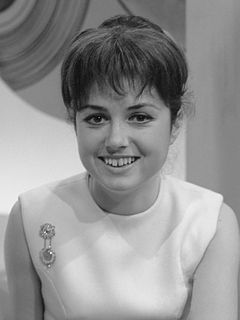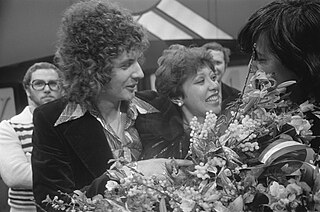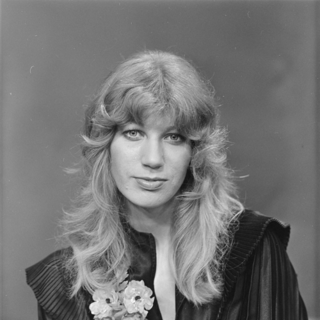
Teach-In was a Dutch band, best known for winning Eurovision Song Contest 1975 with the song "Ding-a-dong". The band was founded in 1967 and parted in 1980. Throughout this time there were several changes in line-up.

Gigliola Cinquetti is an Italian singer, songwriter, actress and television presenter.
McGuinness Flint was a rock band formed in 1970 by Tom McGuinness, former bassist and guitarist with Manfred Mann, and Hughie Flint, former drummer with John Mayall; plus vocalist and keyboard player Dennis Coulson, and multi-instrumentalists and singer-songwriters Benny Gallagher and Graham Lyle.

"What's Another Year" was Irish singer and composer Johnny Logan's first Eurovision Song Contest winning song, achieving success in the 1980 edition of the contest, as well as Ireland's second Eurovision victory. Composed by Shay Healy, the song reached number one in the UK Singles Chart for two weeks in May.

Hans van Hemert is a Dutch ASCAP award-winning record producer and songwriter. Mouth & MacNeal and Luv' are among the pop acts he produced. He also composed three songs for the Eurovision Song Contest.
Liquid Gold was an English disco group, from Brackley in Northamptonshire. Their biggest success came in 1980 with "Dance Yourself Dizzy", which peaked at number two on the UK chart.

This is a discography of the singles and albums of British pop group Brotherhood of Man.

Maggie MacNeal is a Dutch singer. She was a member of Mouth & MacNeal, a pop duo from the Netherlands, who are best known for their million-selling recording of "How Do You Do" in 1972, which topped the Dutch chart and became a US top ten hit, and for representing the Netherlands at the 1974 Eurovision Song Contest, finishing third with the song "I See a Star", which went on to become a UK top ten hit.
This article presents the complete discography of the British art rock band 10cc.

"Shame, Shame, Shame" is a 1974 hit song written by Sylvia Robinson, performed by American disco band Shirley & Company and released on the Vibration label. The lead singer is Shirley Goodman, who was one half of Shirley and Lee, who had enjoyed a major hit 18 years earlier, in 1956, with the song "Let The Good Times Roll" for Aladdin Records. The male vocalist is Jesus Alvarez. The saxophone solo is by Seldon Powell, whose instrumental version, "More Shame", is the B-side.
The Netherlands was represented by duo Mouth and MacNeal, with the song "I See a Star", at the 1974 Eurovision Song Contest, which took place in Brighton, England on 6 April. Mouth and MacNeal were internally selected by broadcaster NOS to be the Dutch representatives.
The discography of the Eurovision Song Contest winners includes all the winning singles of the annual competition held since 1956. As of 2022, 69 songs have won the competition, including four entries which were declared joint winners in 1969.

"How Do You Do" released in 1971 was an international hit single for Dutch duo Mouth & MacNeal. It was #1 in the Netherlands, Belgium, Denmark, Switzerland, and New Zealand. It also spent 19 weeks in the Billboard Hot 100 a year later, and a cover version by Scots-German duo Die Windows reached #1 in Germany. The single earned Mouth & MacNeal, and its composers Hans van Hemert and Harry van Hoof, the 1972 Buma Export Award for the most records sold abroad by a Dutch musical act in that year.

Wilhelmus Jacobus Duyn was a Dutch singer, actor, and entertainer. Under the stage name Big Mouth he was co-vocalist of the Dutch pop music duos Mouth & MacNeal (1971–1974) and Big Mouth & Little Eve (1975–1977).

This is the discography of former British-American pop singer Tracey Ullman. Known mainly for her work in television and film, she had a brief career as a successful pop singer. She was signed to Stiff Records in 1983 after label owner Dave Robinson heard some of the song parodies she did in her early television work. Her albums consisted mainly of cover versions of songs from the 1950s through the early 1980s.
This article is the discography of English R&B and jazz musician Georgie Fame, both with the Blue Flames and as a solo artist.
This is the discography of Dutch novelty pop group Stars on 45, also known as Starsound in the UK and Stars On in the US.
This is the discography of American singer-songwriter Melanie Safka, mainly known mononymously as Melanie.
This is the discography of American jazz-rock group Blood, Sweat & Tears.
This is the discography of British singer-songwriter Beverley Craven.











